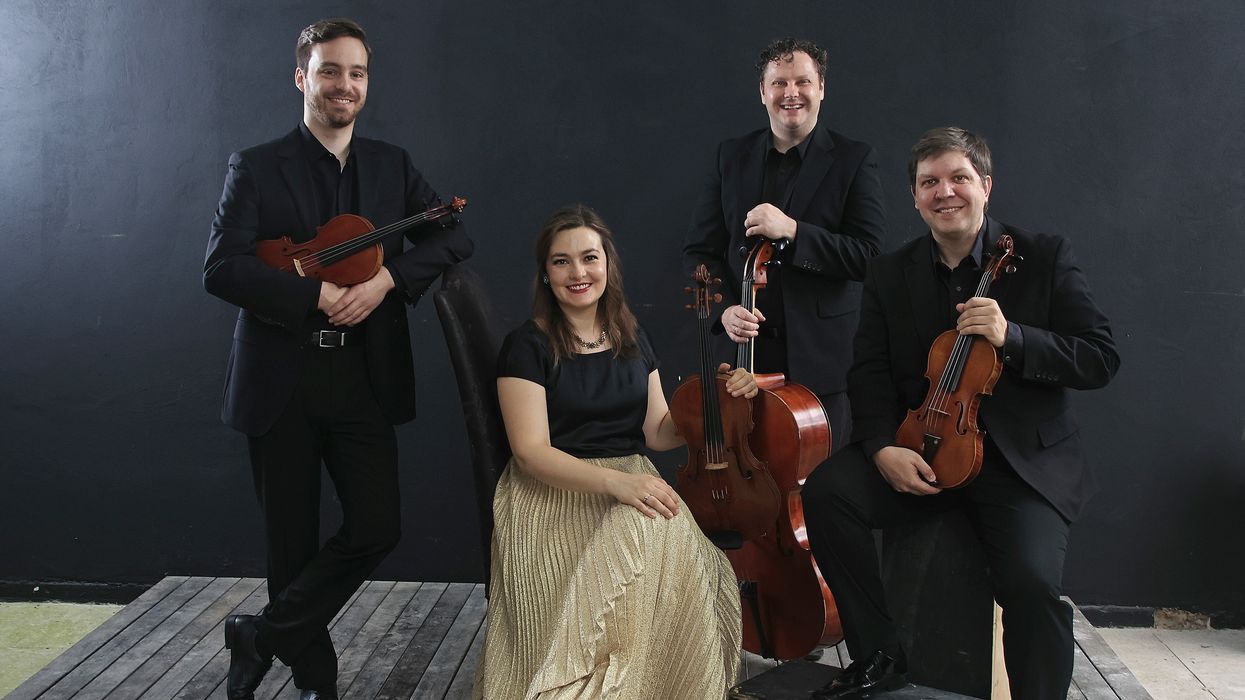This Weekend: Axiom Quartet Plays Contemporary-Classical Concert in the Heights — and Doesn't Play It Safe

ONE CANNOT ACCUSE Houston’s Axiom Quartet of playing it safe. When it comes to exploring the outer limits of string quartet repertoire, engaging audiences who don’t normally attend classical music concerts, and putting in the collective time necessary to nail the gnarly idiosyncrasies of 20th- and 21st-century composers, Axiom continues to walk the walk as they talk the talk.
They’re a dapper bunch; relatively conservative in appearance. You’ll never see founding member cellist Patrick Moore, violist Katie Carrington, or violinists Timothy Peters and Matt Lammers rocking a rainbow mohawk or dressed in studded leather jackets onstage.
Instead, the quartet, who have weathered some recent changes in personnel, embraces an unpretentious, hip-to-be-square attitude, engaging their audiences in down-to-earth language while bringing great classical music to unexpected places, be it a pizza parlor, George Bush Intercontinental Airport, or literally underground at Cave Without a Name in the Texas Hill Country.
On Sunday, Oct. 6, Axiom opens its '24-'25 season above ground at Lambert Hall in the Heights with Risky(er) Business, an intense, historically informed concert that explores the sounds of dissent. The program includes Dimitri Shostakovich’s String Quartet No. 2 and the American premiere of Ukrainian-born composer Nikolai Roslavets’ recently discovered and unrecorded String Quartet No. 5.
Roslavets, a cantankerous modernist who nevertheless wholly embraced the experimental innovations of his time, composed this his final string quartet in the early 1940s, toward the end of his life, and in a decade when his music was officially repressed. Thanks to the efforts of dedicated musicologists and ensembles like Axiom, the extent of Roslavets’ repertoire and contributions to contemporary music are finally coming to light. (On Sunday, Axiom will unpack Roslavets’ biography and life under totalitarianism for the Lambert audience.)
Axiom describes Shostakovich’s second string quartet as “a now-celebrated masterpiece written with feverish frustration … giving voice to the Russian people through a transformed folks song.” Musicologists believe Shostakovich used the string quartet as a platform to communicate, albeit in cryptic, even contradictory language, his true feelings regarding Soviet censorship, oppression, and violence.
The second movement of his String Quartet No. 2 is quintessential Shostakovich, with its impassioned recitatives and romantic folk melodies ascending over inverted dominant seventh chords that sit undisturbed like pools of black water.
By the time the movement’s haunting and dissonant chorale appears, you can almost imagine what it must have been like to compose music under Stalin, a time when art was politicized to the point of absurdity, and Shostakovich found himself living a life of relative safety under totalitarian scrutiny.
- Next-Gen Classical Musician Krempasky Stars on Album Composed by Her Fave Prof ›
- Houston Composer Orchestrates Musical Suite for Dan Brown’s New Kids Book ›
- In His Quest to Make Composing Music More Approachable, Andrew Schneider Scores with New Record Release ›
- ‘The Polish Duo’ Debuts This Weekend: 'Not Just Sausage and Kolaches,’ Says Violinist of Her Native Land ›
- This Weekend: Mexican Music, ‘Not Just Mariachi and Salsa,’ Gets Amplified ›
- Celebrating 10 Years, Axiom Quartet Navigates the ‘Complexity of Simplicity’ ›












































